Everyone remembers this scene in Indiana Jones. The prize, resting on a pressure plate, had to be swiftly swapped out for a bag of sand so as not to alert the guardians’ booby traps. The same has happened with education. While parents across the country have been blissfully unaware, the whole purpose of education has been replaced by a bag of something else that starts with an ‘s’.
What “College and Career Ready” Used to Mean
“College and Career Readiness” (CCR) is a catch phrase in education, the definition of which has historically differed from state to state. At the broadest level, college and career readiness characterizes students who have the necessary levels of proficiency to enter college or career training programs without remedial assistance. Traditional indicators of core academic skills (such as high school grade point average), class rank, scores on the ACT college readiness assessment and the SAT, and the amount of challenging coursework have typically been used to define CCR. School counselors have long been viewed as an integral part of this process by aiding in such things as: promoting college aspirations, extracurricular engagement, academic planning, college/career exploration & selection, college/career assessments, college financing, college/career admissions, and the transition from high school to the next setting.
What “College and Career Ready” Means Now
Over time, counselors’ roles have expanded, encompassing more than just encouraging academic rigor and helping students figure out if they want to pursue a higher education track or a career technical track. To fulfill their mission in preparing students to be “college and career ready”, school counselors now must also ensure that graduates have the mindsets and behaviors that employers are looking for in future candidates. The National Association of Colleges and Employers (NACE) 2021 list of 8 career readiness “competencies,” created by a task force of representatives from both higher education and corporations, lay out the characteristics employers are desiring the most.
Note that one of the competencies, “Equity & Inclusion,” requires engagement in “anti-racist practices that actively challenge the systems, structures and policies of racism.” As a part of the release of their updated competencies, NACE also identified key behaviors that “allow college students preparing to enter the workforce to demonstrate their career readiness to prospective employers…This is important because the competencies align with the attributes employers most want to see in the college graduates they hire for full-time positions and the college students they bring on board for internships.” (Gray, Kevin, “The Sample Behaviors That Provide Evidence of Career Readiness,” NACE, 03 May 2021, NACEWeb.org)
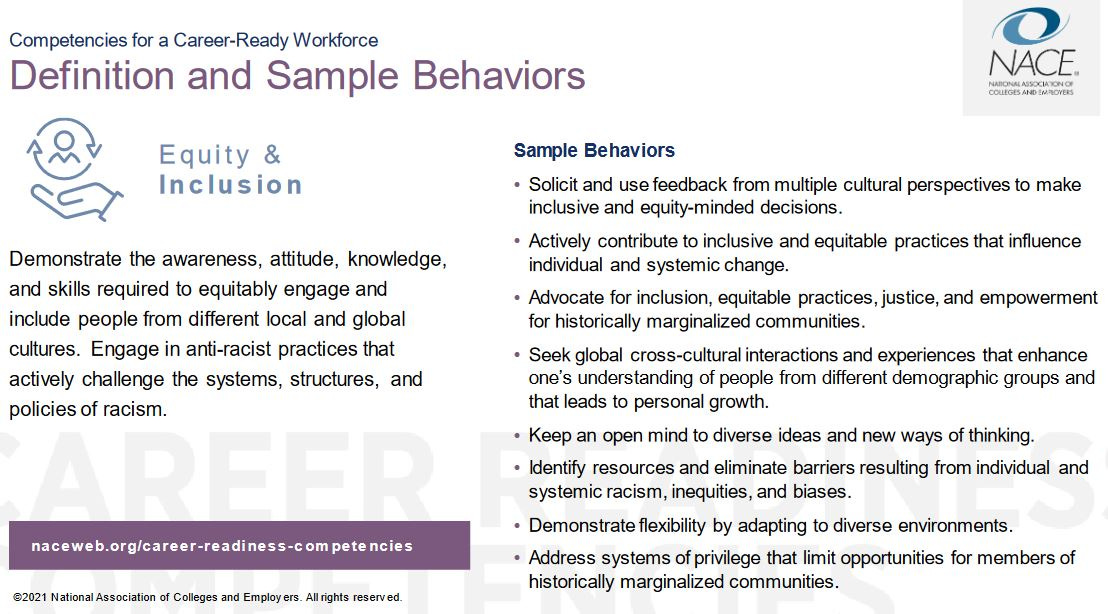
Considering University Relations and Recruiting (URR) professionals are being encouraged to use these NACE Career Readiness Competencies in their recruiting and professional development efforts, it begs the following questions:
Will a student not be considered career-ready, then, if they don’t believe in the Marxian Critical Race Theory tenet of systemic racism?
Are prospective candidates not employable if they haven’t demonstrated their activism by attempting to tear down the systems of society which Critical Race Theorists believe are set up to intentionally oppress people of color?
More importantly, how does the influence of these competencies trickle down into the role of school counselors and consequently the K-12 classrooms of youth across the nation as they prepare them for postsecondary readiness?
The American School Counselor Association (ASCA) Standards
NACE’s competencies influence other organizations like ASCA, the American School Counselor Association, who adopted a National Model for school counseling programs which serves as a guide in the development of programs implemented by school counselors at a local level. As a part of this model, ASCA has three sets of school counseling standards that define the entire profession and its role in the school-to-employment pipeline. ASCA Student Mindsets & Behaviors for Student Success: K-12 College and Career Readiness for Every Student describes what is expected of students in order for them to be considered “college and career ready” and both their Ethical Standards for School Counselors and School Counselor Professional Standards and Competencies clarifies what is expected of school counselors and the profession as a whole.
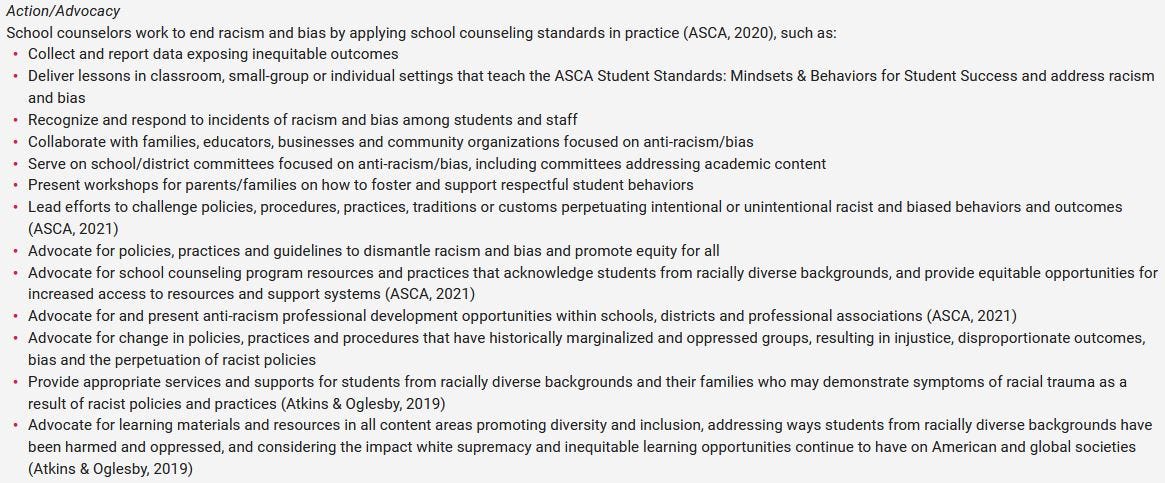
According to ASCA’s standards, counselors are seen as agents of systemic change and are expected to apply an anti-racist and social justice framework when it comes to their role at the school. This has far reaching implications considering that school counselors guarantee that the entire school’s standards, policy, curricula, assessments, etc. are all aligned and centered around the goal of creating students who are “college and career ready,” the definition of which has also recently changed.
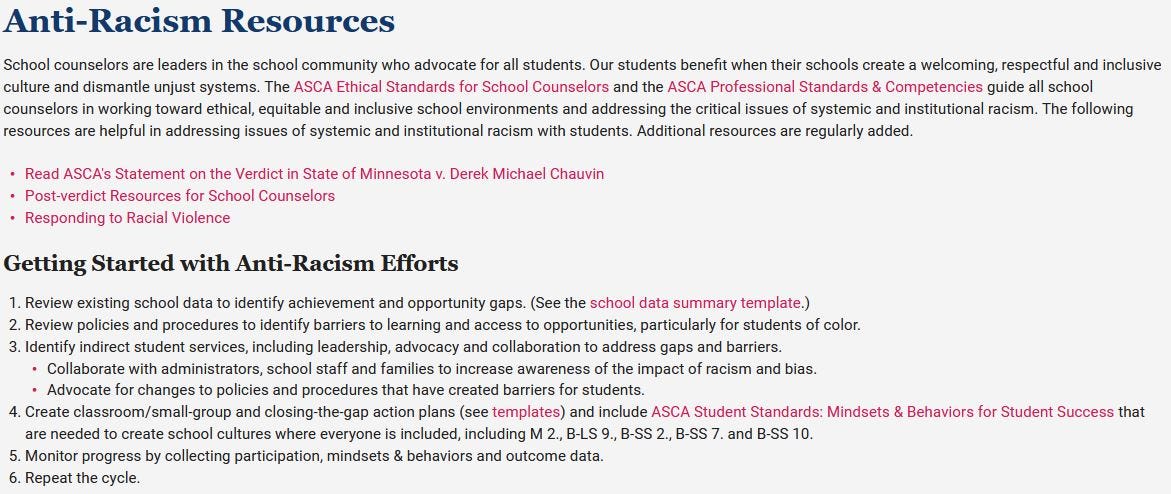
ASCA’s Student Standards which describe the knowledge, attitudes and skills students should be able to demonstrate as a result of a school counseling program was revised in 2021. This revision was informed by the 2018 Social Justice Standards: The Teaching Tolerance (now Learning for Justice) Anti-Bias Framework. As such, additional language to the existing standards and added standards reflect the new Marxist-derived social justice activist mindsets and behaviors students are expected to have in order to be “college and career ready.”
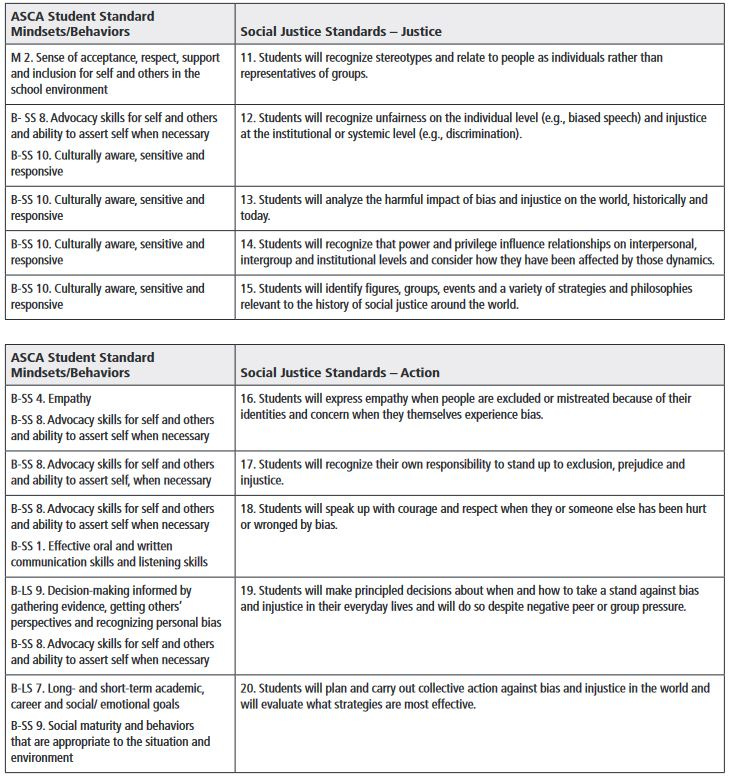
Whole School Intervention
To track student progress in their acquisition of skills, school counselors write or select measurable learning objectives that align with specific mindsets and behaviors from the above codes and those learning objectives directly reflect the school counseling program’s vision, mission and goals, as well as the school’s academic vision. Concurrently, student growth toward those objectives is gathered through assessments that collect data on their mindsets and behaviors. It makes sense, then, why there has been an influx of curricula that is racially charged, including “Tier 1”/”whole school” intervention materials like social emotional learning (SEL) programs based on CASEL’s new definition of Transformative SEL as well as SEL measuring and tracking tools like those provided by Panorama Education. All children are “at risk” and in danger of not graduating with the “correct” mindsets and behaviors. As such, they need to be exposed to material that teaches them about “implicit bias” (that all white people are inherently racist toward people of color) and other CRT tenets like White Power and White Privilege. Students are expected to adopt those beliefs and become activists who are “doing the work” to dismantle the systems of oppression because if they don’t, they won’t possess the employability skills that qualify them to be “college and career ready.” The day is soon approaching (if not already here) when graduates who gave their all to earn excellent grades and test scores will be confused about their lack of opportunity in higher education and beyond. Unbeknownst to them and their bewildered parents, it will be because their transcript didn’t say that they scored well in “social justice.”

Utah: A Case Study
These huge shifts in what constitutes counseling and postsecondary readiness are evident in the education system of Utah. Significant changes have been made, as explained in Utah’s 3rd edition of their College and Career Readiness School Counseling Program, in an attempt to adopt, and even expand on, the new ASCA National Model. Utah school counselors are now expected to “demonstrate accountability, social justice, and systemic change” (pg.17), and their school counselor certificate program standards reflect the practices they must engage in to live up to that.
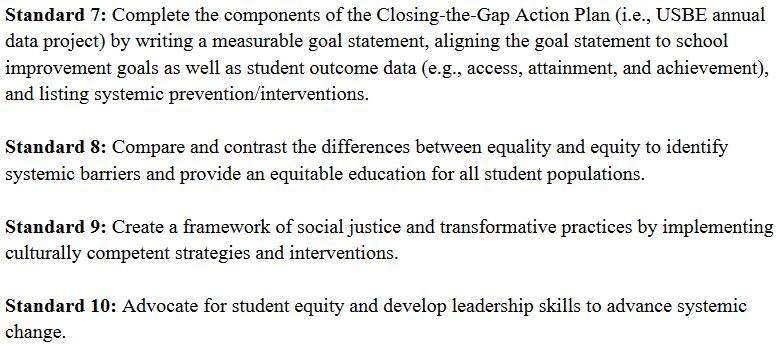
It’s obvious from the above chart that what used to be a basic service approach to counseling in the state has become more comprehensive, inextricably interwoven into all areas of education, and “transformational.” Utah counselors (in collaboration with the state board) have gone all-in/full-out in their efforts to install Tier 1 interventions by purchasing both social emotional learning programs that teach CASEL’s Marxian Transformative SEL as well as SEL measurement tools that track and score this sensitive data. As students move through the K-12 system, counselors are responsible for analyzing this data about students (which is stored in the statewide longitudinal data system) to identify patterns and trends in student development measured by four mindsets and competency domains: academic/learning, life/career, multicultural/global citizen, and social/emotional. Data is used to not just provide individual counseling and interventions to help students adopt the right mindsets and behaviors, but also to identify further systemic interventions that address “problematic” school and district policies that contribute to inequitable outcomes.
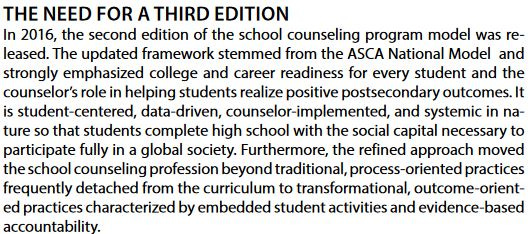
As evidenced by their adoption of Portrait of a Graduate, their shift to personalized competency-based learning (PCBL), and their participation in CASEL’s Collaborating States Initiative, Utah (with the help of its school counselors) has completely aligned its education and workforce policy through a social emotional learning lens. This is all part of a concerted effort to teach the mindsets and behaviors they believe students need to be multicultural/global citizens who possess the “emotional intelligence” needed for the future workforce.
As companies have begun to fret about losing capital through the enforcement of Environmental, Social and Governance (ESG) scores and want to boost those scores by prioritizing social justice activism as an attribute in their hiring practices, students in Utah and all across the country will be put up against the cruel yardstick of “college and career readiness.” Those words, much like the whole purpose of education, have been stolen. The question is, will the guardians of this precious treasure finally notice and do everything in their power to stop it?




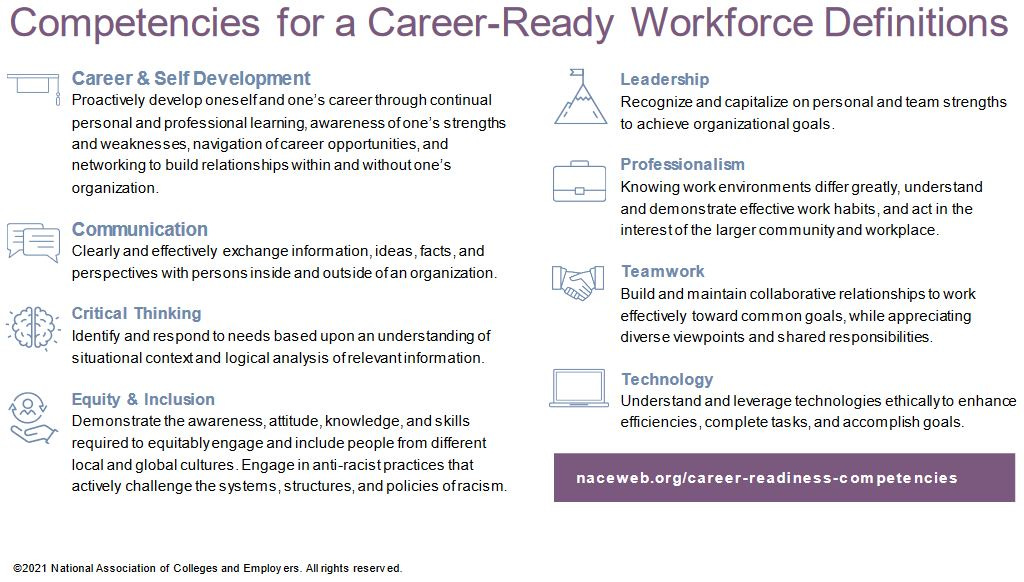
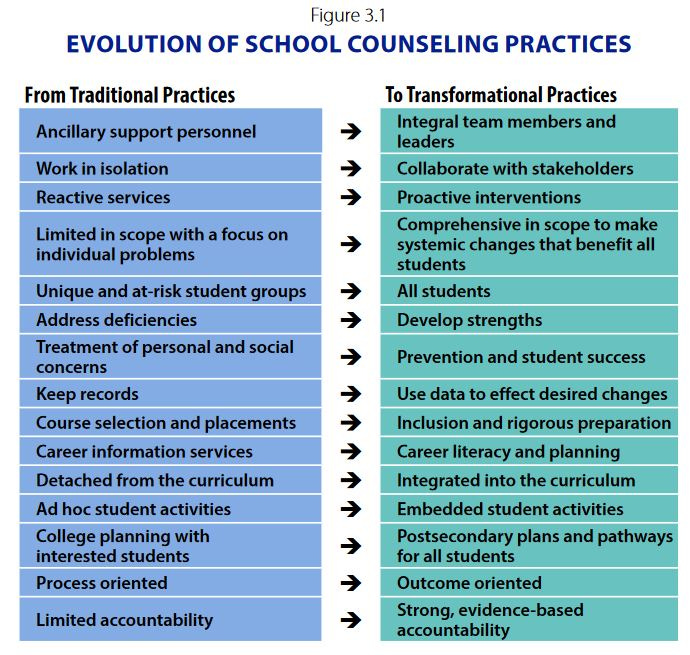
This is crazy!!! We must fight this!!!
Excellent work!